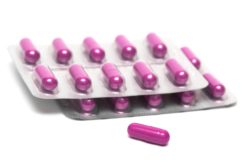
A recent study has shown that use of proton pump inhibitors may double a person’s risk of testing positive for COVID-19.
The study, published on July 7 in the American Journal of Gastroenterology, found that patients who took proton pump inhibitors, faced an increased risk of COVID-19 diagnosis, especially when taken at a higher dosage.
“We found that PPI use, particularly twice-daily dosing, is associated with increased odds for reporting a positive COVID-19 test, even after accounting for a wide range of sociodemographic, lifestyle, and clinical variables,” Christopher V. Almario, MD, MSHPM, the study’s author from the department of Medicine at Cedars-Sinai Medical Center in Los Angeles, told Healio Gastroenterology.
Researchers conducted a survey among more than 50,000 patients between May 3 and June 24, 2020. Of the total of 53,130 patients included in the survey, 3,386 tested positive for COVID-19. Researchers found that patients who used PPIs once daily faced significantly increased odds for a positive COVID-19 test, and those taking it twice daily faced an even more elevated risk. Notably, patients taking histamine-2 receptor antagonists (H2RAs) saw no increased risk. H2RAs are another option for treating stomach acid.
What does this mean for those taking PPI medications? “Our findings continue to emphasize that PPIs should only be used when clinically indicated at the lowest effective dose,” Dr. Almario said. In other words, don’t take a higher dosage than what your doctor has actually prescribed—only enough to be effective treatment.
“This study does not mean that people on PPIs should just stop their medicines,” Brennan M.R. Spiegel, MD, MSHS, professor-in-residence of medicine and public health at Cedars-Sinai Medical Center, David Geffen School of Medicine at UCLA and UCLA Fielding School of Public Health, told Healio Gastroenterology.
“PPIs work and, in most cases, their benefits outweigh the risks. As always, the decision about whether, when, and how to modify PPI dosing should be based on a thoughtful assessment of the risk-benefit ratio for individual patients. As with any medication, the lowest effective dose should be used when clinically indicated, and, when appropriate and consistent with best-practice guidelines, H2RAs may also be considered as an alternative treatment for acid-related conditions.”

“By no means do we say that people need to stop their PPIs,” said Dr. Almario, reports LiveScience. “We found an association here; again, this needs to be confirmed.”
A link between PPI usage and COVID-19 could have a severe effect on many Americans. Indeed, about 15 million Americans routinely take prescription PPIs, and more take over-the-counter options. Many of these people may actually be overusing them or taking them long after they are no longer needed.
Again, patients shouldn’t stop taking prescribed medications without first consulting their doctor, even if they hear about potential side effects.
This potential increased risk of COVID-19 is the latest health complication that has cropped up in relation to taking PPIs.
What Are PPIs?
Proton pump inhibitors (PPIs) are medications that help reduce the symptoms associated with acid reflux, and are some of the most common medications in the U.S. PPIs work by blocking the enzyme in the stomach wall that produces acid. Acid reduction, in turn, helps to prevent ulcers, as well as heal any ulcers that already exist.
Popular PPI options include:
- Nexium
- Prevacid
- Protonix
- Prilosec
- Zegerid
- Others
Unfortunately, PPI medications have been linked with a number of significant health side effects, including cardiovascular disease, kidney problems, and stomach cancer.
Filing a PPI Side Effect Lawsuit
A growing number of patients taking Nexium and other PPI drugs are filing litigation, alleging that their use of this drug has led to serious side effects. Side effects cited in litigation has included kidney damage, cardiovascular issues, and stomach cancer, among others, but may soon include increased COVID-19 risk.
Lawsuits allege that the PPI manufacturers either knew or should have known about the serious risks associated with these drugs, yet failed to adequately warn patients and the medical community about these risks.
If you or someone you love has suffered from these or other side effects of proton pump inhibitors like Nexium, you may be able to file a lawsuit and pursue compensation. While filing a lawsuit cannot undo the pain and suffering caused by these health complications, nor can it bring a loved one back to life, it can at least help to alleviate the financial burden incurred by medical expenses, lost wages, and more.
Filing a lawsuit can be a daunting prospect, so Top Class Actions has laid the groundwork for you by connecting you with an experienced attorney. Consulting an attorney can help you determine if you have a claim, navigate the complexities of litigation, and maximize your potential compensation.
ATTORNEY ADVERTISING
Top Class Actions is a Proud Member of the American Bar Association
LEGAL INFORMATION IS NOT LEGAL ADVICE
Top Class Actions Legal Statement
©2008 – 2026 Top Class Actions® LLC
Various Trademarks held by their respective owners
This website is not intended for viewing or usage by European Union citizens.
E-mail any problems with this form to:
[email protected].
Oops! We could not locate your form.












